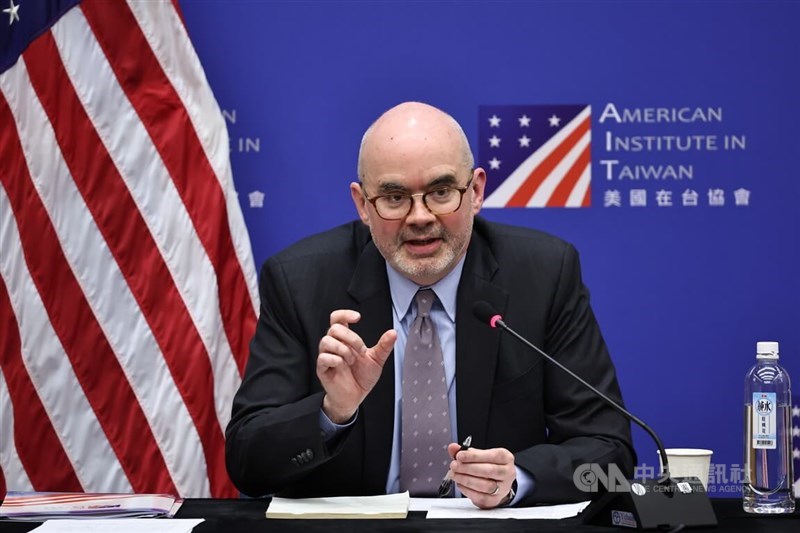
Taipei, Sept. 4 (CNA) The new de facto United States ambassador to Taiwan Raymond Greene on Wednesday listed enhancing bilateral cooperation to boost Taiwan's overall resilience and security, as well as facilitating its connection to the world, as his top priorities.
Speaking during his first press conference since taking office as director of the American Institute in Taiwan (AIT) in July, Greene, in his address delivered in Chinese, noted that the world has become increasingly aware that maintaining cross-strait peace is vital.
About half the world's trade passed through the Taiwan Strait and up to 90 percent of high-end semiconductors were made in Taiwan, he noted.
"If peace and stability across the Taiwan Strait are disrupted, the global economy will suffer a heavy blow and every country will be affected," he said.
Greene said his chief mission as AIT director is to continue to enhance Washington-Taipei cooperation by focusing on three priorities, namely, "resilience, security and connectivity."
He pledged that the U.S. will help Taiwan beef up its resilience against climate change, natural disasters, global epidemics and geopolitical risks.
On the U.S. security commitment toward Taiwan, the American envoy reiterated his government's stance to provide Taiwan with arms sales to support its self-defense capabilities.
Greene also said the U.S. is committed to enabling Taiwan, a highly developed economy, to share its expertise in multilateral forums.
He added this includes calling for Taiwan's meaningful participation in the United Nations system and other international organizations.
Washington will also continue to increase economic, trade and cultural exchanges with Taiwan, he noted.
The AIT represents U.S. interests in Taiwan in the absence of official diplomatic ties. It is headquartered in Virginia and has a main office in Taipei and a branch office in Kaohsiung, with its Taipei director serving as the top U.S. envoy to Taiwan.
During Wednesday's press event, Greene said the Biden administration and U.S. Congress see the issue as a "topic that is a high priority," when asked about the roughly US$20 billion backlog of weapons orders Taiwan bought from the U.S.
Given the conflicts in Europe and the Middle East, as well as the U.S.' military needs, he said "the defense industrial base in the United States and our partners is under increasing strain."
The U.S. government is now tapping into "non-traditional sources of supply" by working with companies not traditionally in the defense sector to provide asymmetric capabilities, he added.
The U.S. is also collaborating more with countries that have significant manufacturing capabilities to boost the global defense industrial supply chain, he noted.
Asked if Taiwan could potentially join such a defense industrial supply chain, the AIT director said it could be an option.
Washington is working with several partners on the possibility of expanding the joint production of military material and supplies, "and I would not rule out Taiwan being one of those partners in the future," he said.
On whether the AIT has a U.S. citizen evacuation plan ready should China invade Taiwan, Greene said Washington and its allies in the region -- namely Japan, Korea and the Philippines -- have been strengthening their alliance over recent years to prevent a potential cross-strait conflict.
The growing network of alliances and Taiwan's defense reform efforts are working to maintain the status quo in the region, he said.
"We don't have a special plan or discussions about evacuations. We have also not talked about this with any outside parties," he added.
On the issue of President Lai Ching-te (賴清德) potentially stopping on U.S. soil before visits to Taiwan's diplomatic allies, Greene reiterated Washington's long-held stance on the issue.
"We facilitated seven transits for President Tsai [Ing-wen] (蔡英文) during her term in office," he said.
The U.S. expects Lai to visit Taiwan's diplomatic partners in the future "and we look forward to facilitating his transit in the United States when those plans come up," he added.
Greene, whose most recent post was as deputy chief of mission of the U.S. Embassy in Japan, took up the Taipei post in July, succeeding Sandra Oudkirk, who left the office after concluding a three-year tenure.
This marks the third time Greene has been posted in Taiwan, according to the AIT. He served as deputy AIT director from 2018 to 2021.
- Politics
Taiwan's embassy in Tuvalu blasts Beijing over 'disinformation'
01/15/2025 01:14 PM - Society
Taiwan headline news
01/15/2025 10:56 AM - Business
Taiwan shares open lower
01/15/2025 09:32 AM - Society
- Society
Taiwan to see cold temperatures and rain on Wednesday: CWA
01/14/2025 09:48 PM